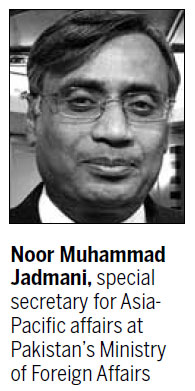Sea port set to help strengthen economic links
The Gwadar Port is a key component of the planned China-Pakistan economic corridor, and cooperation on it "is not aimed at undermining the interests of any third party", a senior Pakistani diplomat told China Daily.
Noor Muhammad Jadmani, special secretary of Asia-Pacific affairs at Pakistan's Ministry of Foreign Affairs, rejected media reports that the port on the Arabian Sea is for "military use".
He attributed the doubts cast over the port to "certain vested interests that would like to look at and give twists to the cooperation that we have carried out."

The Gwadar port forms one part of a larger economic corridor project stretching from Gwadar to Kashgar, in the Xinjiang Uygur autonomous region, linking China to the Arabian Sea.
Administrative authority for the port previously rested with a Singaporean company. It was transferred to a Chinese company in February.
"This port will be facilitating China's exports as well as Pakistan's own economic development and activities," Jadmani said.
The port needs to be effectively utilized, and the operation is expected to pick up speed, said Jadmani, who was Pakistani ambassador to Japan before assuming his current office earlier this year.
"Clearly, the Pakistan-China relationship needs to be further enhanced for mutual benefit, and this is a project that would help us out," he said.
In the past few months, Pakistan has witnessed the elections of a new prime minister and president. Concerned speculation is rife in Islamabad regarding the potential changes in Pakistan's diplomatic priorities.
A "peaceful neighborhood" including India and Afghanistan is what Pakistan prioritizes in its diplomatic guidelines, Jadmani said.
Peace and security are very important for the economic development, he said. "This is a global village, and interdependence is growing."
Jadmani underscored Islamabad's unchanged commitment to strengthening the strategic partnership with Beijing. "The friendship is more than six decades old, and we cherish our friendship," he said.
In addition to boosting the energy sector for a stronger economic impetus, domestic security is also a priority.
Domestic policies could be "more proactive than reactive" to fight terrorism, said Jadmani, who condemned a terrorist attack in late June that killed two Chinese citizens.
"The Pakistani government is taking care to ensure the safety and security of those who are working here. There is extra security given to our Chinese friends," he said. He described bilateral cooperation in infrastructure projects as "salient", saying many Chinese engineers have given their lives for the Karakoram Highway that connects the two countries.
Bilateral trade reached more than $12 billion last year, and Islamabad is "working in the direction" of raising this figure to $15 billion by 2015. China is a very "strong emerging market", he said.
During his visit to the country in May, Premier Li Keqiang proposed helping Pakistan to cultivate 1,000 Chinese language teachers with the aim of facilitating people-to-people exchanges.
Li vowed to build more Confucius Institutes in Pakistan, including one to be located in Karachi.
"Then probably six to seven centers will be opened around the country," Jadmani said.
He said various projects contracted or operated by the Chinese in Pakistan had contributed to a growing enthusiasm for learning Mandarin.
"If you know the language, it is very helpful to further cement the bond of friendship."





















